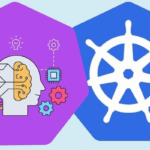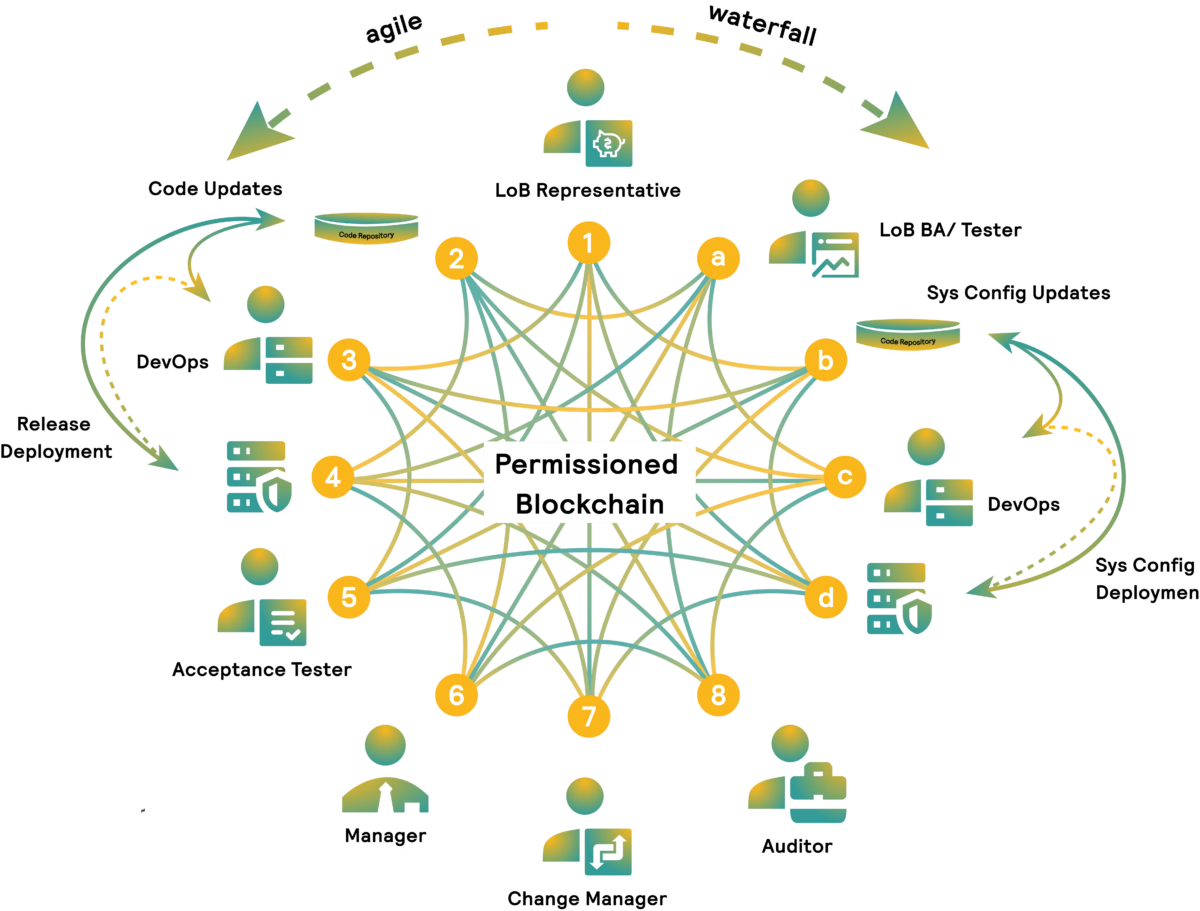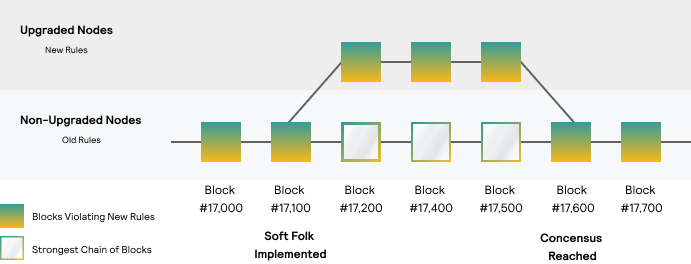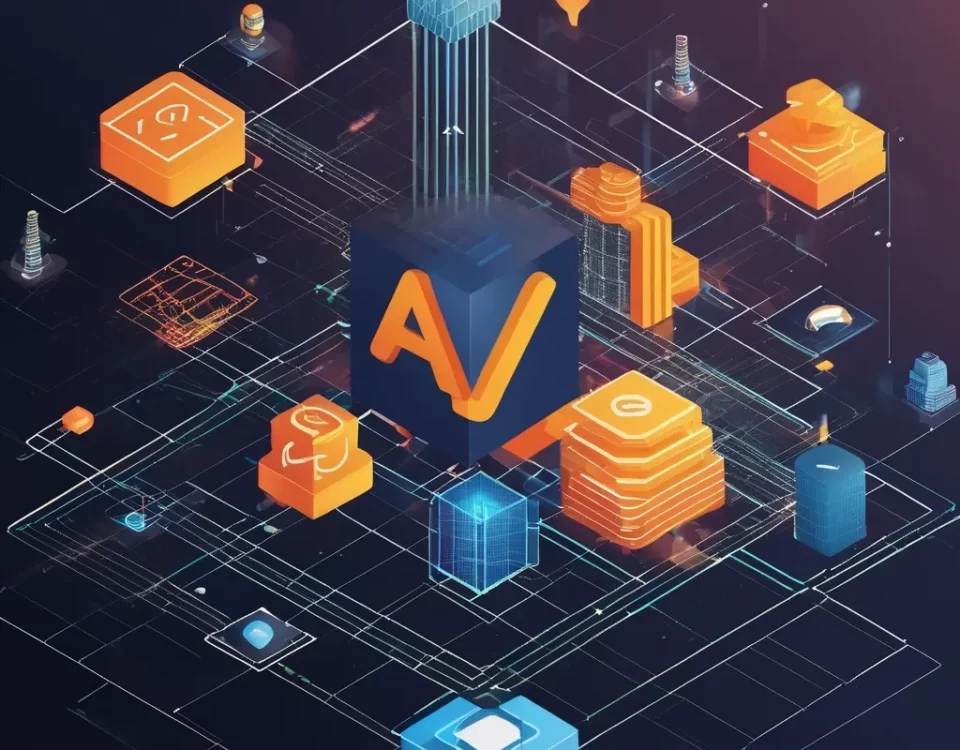
LLM Agents: How They Work and Where They Go Wrong
March 31, 2025
AI For Kubernetes – K8sGPT
April 21, 2025Let’s start with some basics. What makes the idea of combining DevOps methodology with blockchain-based technology appealing?
DevOps is a methodology that enables development and operations teams to collaborate, communicate, and continuously improve. It’s built around automation — the primary goal is to allow many departments or organizations to streamline the release, testing, and deployment of error-free code.
Blockchain is a distributed immutable database of transactions. Activities in the ledger are managed by smart contracts — embedded algorithms that execute actions based on predefined conditions with automated rules.
Companies mostly use blockchain applications for peer-to-peer (P2P) financial transactions because smart contracts conduct them without external authority and enforcement mechanisms. But there’s a way to use blockchain’s immutability, transparency, and automation to enhance other mission-critical processes.
The Combination of DevOps and Blockchain Technologies
DevOps teams usually focus on small but frequent iterative code deployments. To expedite processes, teams typically rely on automated CI/CD tools, automated application testing, release management practices, and container orchestration platforms (Kubernetes).
Aside from some peculiarities, the DevOps methodology works for blockchain development more or less the same as for other projects. Engineers apply code fixes and develop new capabilities in local environments, test the changes, and submit them to the source control system.
Applying blockchain principles to DevOps is where it gets interesting. Distributed ledgers can make many DevOps processes more secure, transparent, and stable. Integrating smart contract algorithms in your CI/CD pipeline can also automate resource-intensive processes.
How Companies Use Blockchain with DevOps

Blockchain enhances DevOps by providing an immutable, auditable ledger for tracking all activities (code changes, tests, deployments, etc.) as transactions. Key benefits include:
- Automated Deployments & Testing
- Smart contracts + Infrastructure as Code (IaC) ensure consistent deployments.
- Tests (functional, security, regression) auto-trigger on code release; failures alert developers.
- Transparent Auditing
- Digital signatures track user actions, improving accountability.
- Managers/auditors easily review project status, changes, and compliance.
- Enhanced Security (DevSecOps)
- Security checks (vulnerability scans, authentication) are embedded early (“shift left”).
- Tamper-proof records and consensus mechanisms prevent fraud.
- Proactive Quality Assurance
- SLA deviations are logged in real time, with automated alerts.
- Protocols like DSLA use crypto-collateral to enforce performance guarantees.
Challenges of Blockchain Implementation in DevOps
Combining Blockchain and DevOps smart contracts presents specific challenges and considerations. Here’s how you can deal with some of the most common ones.
Populating blockchain environment with test data

Blockchain technology groups transactions into unalterable blocks in chronological order. This complicates the traditional DevOps pipeline because populating a network with test data and scripts requires coordination and sequencing.
A popular solution is to use “forks” — snapshots of existing blockchains. Forking refers to the instant when a blockchain splits into branches due to changes in the algorithm or other software. A hard fork happens when a radical change makes previously valid transactions unacceptable, whereas a soft fork means a change that keeps the protocol backward-compatible.
Teams also use blockchain and DevOps tools to streamline test and production environments. One such tool is Ganache CLI — a command-line Ethereum-based utility for testing and deploying contracts and applications on the blockchain.
Organizational culture management
Implementing blockchain and DevOps, like any transformation, relies on your ability to manage your company’s culture. According to Gartner’s 2019 research, by the end of 2022, about 75% of DevOps initiatives will have failed due to poorly implemented organizational learning and change.
Transparency is a core ingredient of successful change management. According to Gartner’s 2019 Changing Change Management report, leading organizations start transforming from the bottom up. You should communicate organizational changes to every affected party: engineers, operations teams, and managers. As a result, your employees will understand the goals of the change and likely won’t be as resistant to radical transformations.
Applying DevOps metrics
Even though blockchain makes DevOps metrics more visible, many teams still need to figure out what to measure. Half of the respondents to Atlassian’s DevOps Trends Survey didn’t have a clear way to measure their pipeline performance.
Some metrics we use to gauge performance include standard DORA metrics (deployment frequency, lead time for changes, change failure rate, and mean time to recovery). Meanwhile, software engineering reliability has been proposed as a key performance indicator in Accelerate’s 2022 State of DevOps Report.
You can refer to our article about DevOps metrics to learn what metrics can help you evaluate and effectively improve your cost-efficiency, code quality, and security.
Multifaceted testing
Implementing DevOps for blockchain smart contracts demands much more rigorous risk management than traditional software development does. What’s more, your projects will require extra contract and node testing in addition to standard functional, integration, performance, and security checks.
All this is complicated because you can’t modify smart contracts after release. Every vulnerability you leave will inevitably become an exploit for hackers.
Apply DevOps and DevSecOps security automation tools from the initial phases of development. All blockchain members should test applications on the local, private network, and consortium levels to ensure they comply with security standards. In addition, it’s necessary to write as many tests as possible to check the code for preconditions. Don’t neglect third-party audits, as they can expand your testing scenarios and identify hidden issues.
For easier testing, design smart contracts similar to microservices. This includes dividing a solution into core entities with discrete contracts for each and deploying them independently. For example, you can put payment functions in a separate module with dedicated contract algorithms that behave independently of the rest of the smart contract layer.
Performance penalties
Enforcing DevOps practices with blockchain adds performance penalties.
A 2020 paper on DevOps Contracts shows that operational execution time can increase threefold, depending on the number of contracts, constraints, and contract terms. Plus, nearly 56% of responders of Accelerate’s 2022 DevOps report agree that extra security checks slow down the development process.
To increase your throughput, you can limit logging to essential activities and contract enforcement transactions. Some companies use private and consortium-distributed blockchains that reduce processing time with simplified consensus protocols and fewer trusted nodes.
Heavy resource requirements
A blockchain infrastructure demands significant computing resources, third-party software, network expenses, and the cost of energy and licenses. As your network acquires more nodes, the associated costs grow.
However, you can make use of the open-source nature of blockchain technology to reduce some costs. Engineers have full code to create their own smart contracts, consensus mechanisms, and the application’s front end.
You don’t even need to build a network from the group up. Instead, you can focus on developing a frontend and contract layer for your applications. Then, integrate your solution into an existing blockchain network without investing in expensive hardware and consensus mechanisms.
Insufficient DevOps and blockchain talent
According to Accelerate’s 2022 DevOps report, less than 11% of teams actually excel at DevOps. And the 2021 Electric Capital report shows that 80% of blockchain developers joined the industry in the last few years. So you can imagine how rare it is to find teams experienced in blockchain technology with DevOps (Kubernetes and CI/CD tools, among others).
Professional developers use open-source tools like Truffle Suite that provide a development framework, testing framework, and a configurable pipeline for blockchain projects. You can also ease your transition with platforms like Microsoft Azure or Zeeve, which provide scalable infrastructure, a test environment, and CI/CD pipeline releases for multiple teams.
Alternatively, you can hire a company to help you merge the best practices of continuous improvement with a blockchain ledger and smart contracts.
FAQ
1. Is DevOps used in blockchain?
DevOps can be applied to blockchain development and deployment processes. DevOps methodologies (continuous integration, continuous delivery, and automation) are used with smart contracts and the immutable ledger to automate workflows, make processes more audible, and secure delivery.
2. What DevOps tools can be used to develop blockchain applications?
Several DevOps tools can improve blockchain application development, testing, and deployment. Tools such as Terraform, Ansible, and Kubernetes can be used to manage, orchestrate, and scale blockchain-based applications in various environments. Blockchain integration can also be streamlined with testing frameworks and infrastructure-as-code (IaaC) platforms for automated transaction monitoring.
3. How are blockchain and DevOps related?
Blockchain and DevOps are connected by shared goals of fostering efficiency, collaboration, and automation. Combining the two lets organizations leverage blockchain’s transparency, immutability, and self-executing rules to strengthen development and operations. It also helps improve your organization’s security, data integrity, and compliance.
4. How can Alpacked help with DevOps implementation in blockchain?
Alpacked is an experienced DevOps company specializing in managed services for various technologies, including blockchain. We can integrate the latest DevOps tools into your CI/CD pipeline to help you develop smart contracts and applications more efficiently. Our team can share strategies and practices to improve the security posture of your blockchain-based apps. Finally, our company can train your internal team to adopt blockchain and DevOps methodology more quickly.


